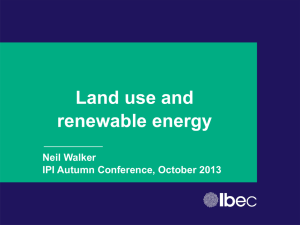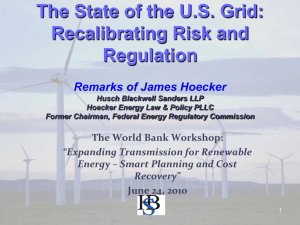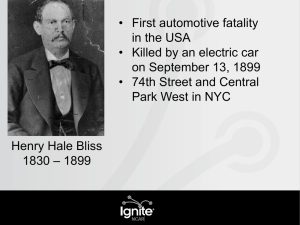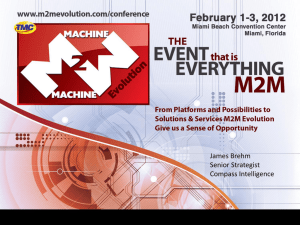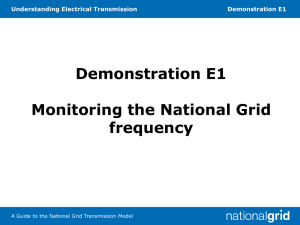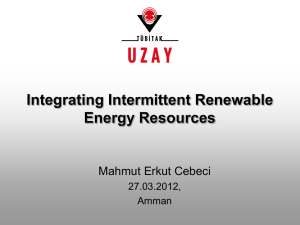“DG and EV Penetrations for Future`s Smart Network in Turkey”, Sitki
advertisement
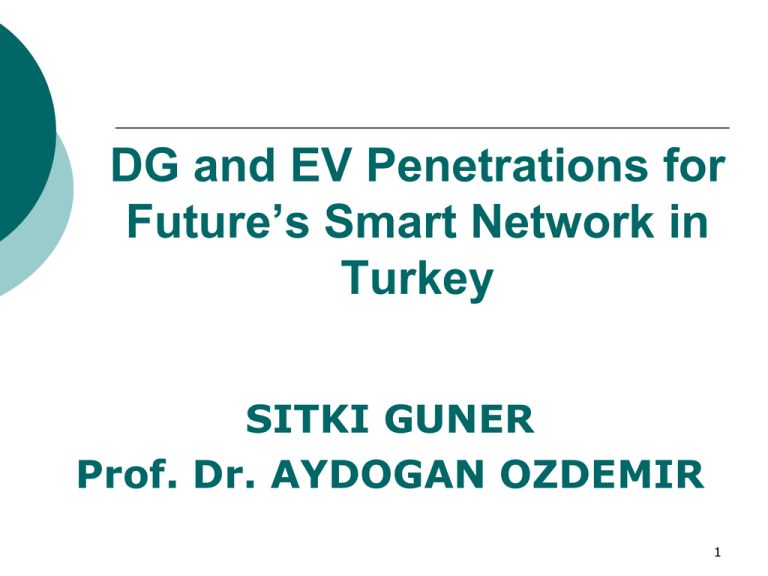
DG and EV Penetrations for Future’s Smart Network in Turkey SITKI GUNER Prof. Dr. AYDOGAN OZDEMIR 1 OUTLINE • Introduction • Smart Grid • Distributed Generation • Electric Vehicles • Turkish Power System • Suggestions 2 INTRODUCTION • Electric power systems have been evolving all over the world. • Increased unit cost of fossil fuel energy sources have brought the necessity of restructuring electric power industry by which energy sources would be used efficiently and effectively. 3 INTRODUCTION • At first, deregulated operation was first approved in many countries, since rigorous regulations had prevented efficient utilization of energy resources. • Later, open-access environment was established where the consumers were allowed to choose their electrical energy providers. 4 INTRODUCTION • Demand and supply of electrical energy are more flexible then it was in the past. This flexibility is expected to increase in the future power systems. • In this evolving process, Smart Grid, Distributed Generation, and Electric Vehicles are hot topics of the electric power networks. 5 SMART GRID • Smart Grid is a new type power network which includes communication, advanced metering and measurement infrastructures as well as a complete decision support. • It is the evolution of power networks. • Smart grid is not created all at once. It will evolve over many years from the existing infrastructure through the development and integration of intelligent systems 6 Main Objectives of Smart Grid Constituting more Efficient Secure Reliable Flexiable Green Economic Power System 7 DISTRIBUTED GENERATION (DG) • Smaller and environmental friendly generators • Connected to the substation, distribution feeder, or customer load level • < 10 MW DG TECHNOLOGIES • Diesel engine driven generators • Photovoltaic systems • Wind turbines • Fuel cells • Micro, and small size hydro turbines DISTRIBUTED GENERATION Advantages Reduce the transmission and distributionloses, Used renewable energy resources, environment friendly, Shorter construction time Lower operational cost Disadvantages Increased short circuit power of the system, Protection problems for bilateral power-flow Changing the structure of the traditional distribution system Intermittent and unpredictable sources (Solar, Wind etc.) 11 DG Operation Modes • Combined heat and power systems, • • Standby power operations, • Peak shaving applications, • Grid support • Islanding operations 12 ELECTRIC VEHICLES 13 TURKISH POWER SYSTEM • Energy Market Regulatory Authority (EMRA) was established in 2001. • Installed capacity in Turkey is 62 GW • %4 of installed capacity is DG. • Some nuclear power plant projects and on-site generation from renewable sources have already started due to the fact that the basic priority of Turkish Power System is supply security. 14 TURKISH POWER SYSTEM • In order to gain energy independency and to provide healthy and sustainable growth, Turkey must invest in national and renewable energy sector. • The extension of distributed and renewable energy generation was the most important attempt for shifting generation plant construction from regulatory authorities to the investors. • Wind energy and solar power are the most valuable renewable energy sources in Turkey. 15 DIFFICULTIES IN TURKISH POWER SYSTEM • When DG is integrated the grid, distribution system should be evolved according to bilateral and variable power-flow. • Protection and switching devices should be recoordinated for bilateral power-flow. • As increasing the number of integrating renewable DG in distribution system, DGs should be used for voltage and frequency control. • Northwestern part (Thrace region) suffers from lack of wind and PV generations not only because of source unavailability but also because of land costs. 16 SUGGESTIONS • Electrical vehicle car parking seems to be an alternative DG source as in other metropolitan cities. • As of March 2014, 26 car parking lots are being operated by ISPARK in BEDAS territory and 215 car parking lots have being planned to construct in a five year period. • One car park may serve as a temporary generating unit of 1.2 MW along 2-3 hours. • Parking lots will be more effective DG sources in the future 17 SUGGESTIONS • Such a capacity brings the usage of car parking lots as a peak shaving DGs. • EV parking lots can be used as cheaper and more reliable sources than the power plants having high installation costs. • Uncertainty of the source can be decreased using some incentives. 18 THANK YOU TO LISTEN ME QUESTIONS ??? 19 Referanslar [C. L. T. Borges, "An overview of reliability models and methods for distribution systems with renewable energy distributed generation", Renewable and Sustainable Energy Reviews, vol. 16, pp. 4008– 4015, 2012. R.C. Green, W. Lingfeng, and M. Alam, "Evaluating the impact of Plug-in Hybrid Electric Vehicles on composite power system reliability", in Proc. North American Power Symposium (NAPS) 2011, 4-6 August 2011, The Alberta Utilities Commission, "Alberta Smart Grid Inqury", Tech. Rep., January, 2011. S. Guner and A. Ozdemir, "Turkish Power System: From Conventional Past to Smart Future", ISGT EUROPE 2011 Innovative Smart Grid Technologies Europe 2011, 5-7 December 2011. T. Ackermann, G. Andersson, and L. Soder, "Distributed Generation: A Definition", Electric Power Systems Research, vol 57, pp. 195– 204, 2001. P. A. Daly and J. Morrison, “Understanding the potential benefits of distributed Generation on power delivery systems,” 2001 Rural Electric Power Conference, pp. A2-1–A2-13. B. Banerjee, S. M. Islam, "Reliability based optimum location of distributed generation", Electrical Power and Energy Systems, vol. 33, pp. 1470–1478, 2011. H. B. Cetinkaya and F. Dumlu, "Possible problems that may arise due to grid integration of dispersed generation and their grid integration analyses", [Online]. Available: http://www.emo.org.tr/ekler/76bfae53cf6ecbd_ek.pdf B. Simsek, M. M. Ocal, and E. Bizkevelci, "An overview about DG systems in Turkey", 11. World Energy Council Turkish National Committee Conference, 21 -23 October 2009, İzmir. Y. M. Atwa and El-Saadany, E. F., "Reliability Evaluation for Distribution System With Renewable Distributed Generation During Islanded Mode of Operation", IEEE Transactions on Power Systems, vol. 24, no. 2, pp. 572-581, May 2009. I. Bae and J. Kim, "Reliability Evaluation of Distributed Generation Based on Operation Mode", IEEE Transaction on Power Systems, vol. 22, no. 2, pp. 572-581, May 2007. P. Jahangiri and M. Fotuhi–Firuzabad, "Reliability assessment of distribution system with distributed generation", 2nd IEEE International Conference on Power and Energy (PECon 08), December 1-3, 20 2008, Johor Baharu, Malaysia. Referanslar Y. Li and E. Zio, "A Multi-State Model for the Reliability Assessment of a Distributed Generation System via Universal Generating Function", Reliability Engineering and System Safety, vol. 106, pp. 28-36, 2012. A. Thornton and C. R. Monroy, "Distributed power generation in the United States", Renewable and Sustainable Energy Reviews, vol.15, pp. 4809– 4817, 2011. G. Wang, Z. Liu, N. Liu, J. Zhang, "Reliability Evaluation of Distribution System With Distributed Generation Based On Islanding Algorithm", Electric Utility Deregulation and Restructuring and Power Technologies DRPT 2008, pp. 2697- 2701, 6-9 April 2008. R. C. Green, L. Wang, M. Alam, and S. S. S. R. Depuru, "Evaluating the impact of plug-in hybrid electric vehicles on composite power system reliability", North American Power Symposium (NAPS) 2011, 4-6 August 2011. R. Villafáfila-Robles, et al., "Electric vehicles in power systems with distributed generation: vehicle to microgrid (V2M) project", Electrical Power Quality and Utilisation (EPQU) 2011, 17-19 October 2011. M. Yilmaz and P. T. Krein, "Review of benefits and challenges of vehicle-to-grid technology", IEEE 2012 Energy Conversion Congress and Exposition (ECCE), 15-20 September 2012. World Energy Council Turkish National Committee (WECTNC), "Turkey Energy Report 2002", Tech. Rep., 2002. S.A. Akdag, and O. Guler, "Evaluation of wind energy investment interest and electricity generation cost analysis for Turkey", Applied Energy, vol. 87, Issue 8, pp. 2574-2580, August 2010. Republic of Turkey Ministry of Energy and Natural Resources, "Electricity energy market and supply security strategy paper" May 2009, [Online]. Available: http://www.enerji.gov.tr/yayinlar_raporlar_EN/Arz_Guvenligi_Strateji_Belgesi_EN.pdfEnergy Market Regulatory Authority (EMRA), "The legislation of electric generation without license", [Online]. Available: www.epdk.gov.tr. The Bosphorus Electric Distribution Corporation (BEDAS), "2011 BEDAS Annual Report", 2011. The Bosphorus Electric Distribution Corporation (BEDAS), "The results of the applications of electric generation without license", [Online]. Available: 21 http://www.bedas.com.tr/sayfa.asp?mdl=duyurular&id=53. Referanslar Istanbul Metropolitan Municipality, "Population Density of Istanbul", [Online]. Available: http://www.ibb.gov.tr/tr-tr/kurumsal/pages/ilceveilkkademe.aspx The Chief Management of Istanbul Car Parking Corporation (ISPARK), [Online]. Available: www.ispark.com.tr 22
